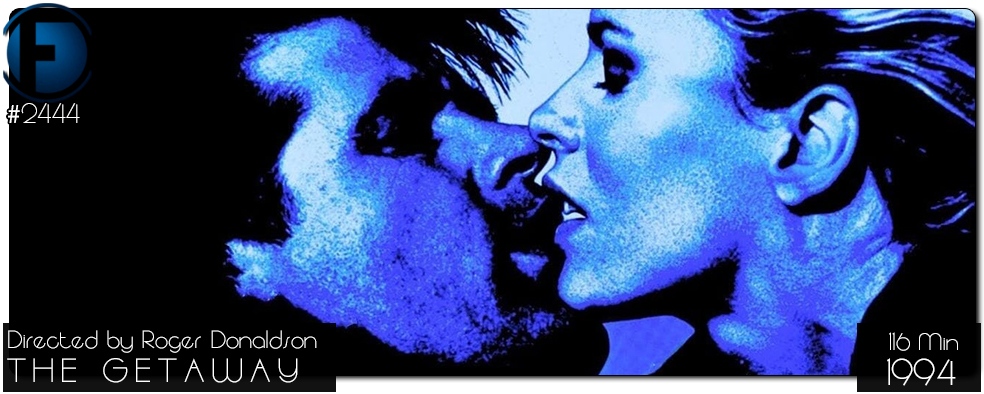Movie Review – Getaway, The (1994)
Principal Cast : Alec Baldwin, Kim Basinger, Michael Masden, Jennifer Tilly, James Woods, Richard Farnsworth, Burton Gilliam, Phillip Seymour Hoffman, David Morse, James Stephens.
Synopsis: An ex-con and his devoted wife must flee from danger when a heist doesn’t go as planned.
********
Marketed largely on the commercial sizzle of then real-life husband and wife acting duo Alec Baldwin and Kim Basinger’s considerable sex appeal, Roger Donaldson’s The Getaway is a film combatively resistant to fully capturing the grim, icy Walter Hill aesthetic it so clearly admires, but it is certainly not for lack of trying. Hill, who penned the 1972 screen version starring Steve McQueen and Ali MacGraw, and co-wrote Ridley Scott’s Alien alongside David Giler, boasts a definitive, brooding style that typified the hard-bitten, almost nihilistic heist-chase subgenre he thrived within. This 1994 adaptation of Jim Thompson’s 1958 novel sees Baldwin and Basinger heat up the screen alongside a then largely unknown ensemble of supporting players, including Jennifer Tilly and a very young Philip Hoffman (credited at the time sans “Seymour”), in a desert-set, blood-soaked wild ride into enthusiastic but ultimately middling mediocrity.
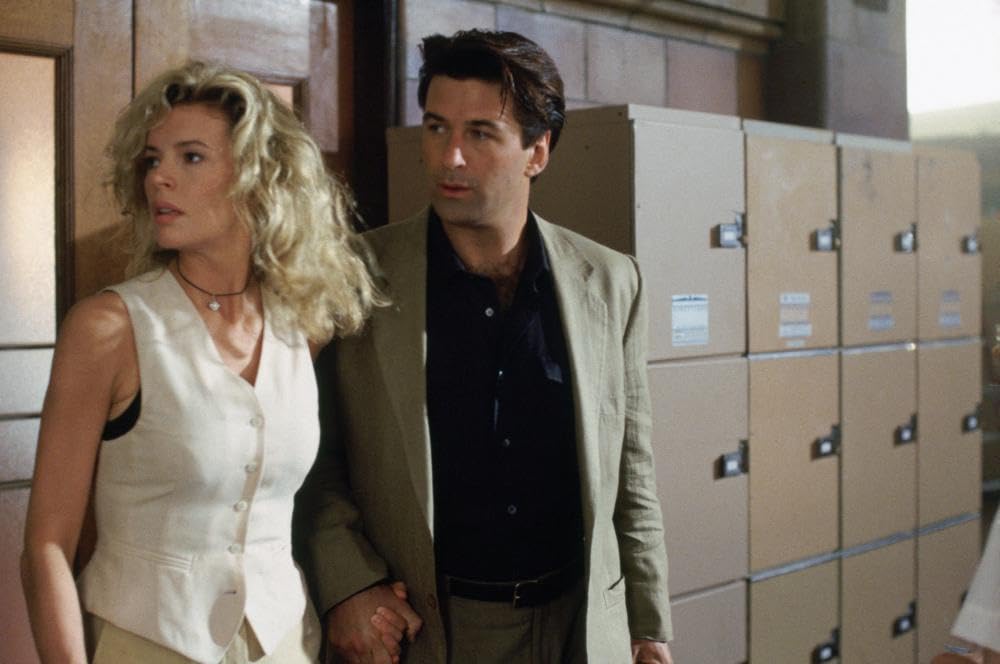
The story follows professional thief Doc McCoy (Baldwin), who, after betrayal and hardship during a Mexican prison stint, strikes a desperate deal to secure his freedom. Together with his resourceful and equally desperate wife Carol (Basinger), Doc embarks on a high-stakes mission to pull off a heist for corrupt businessman Jack Benyon (James Woods). As expected, the job swiftly descends into chaos. With their untrustworthy associate Rudy Travis (Michael Madsen) double-crossing them and Benyon’s men hot on their trail, Doc and Carol must navigate a treacherous path toward the Mexican border, seeking illicit passports and a final escape to freedom, culminating in a ferocious shootout inside a crumbling border-town hotel.
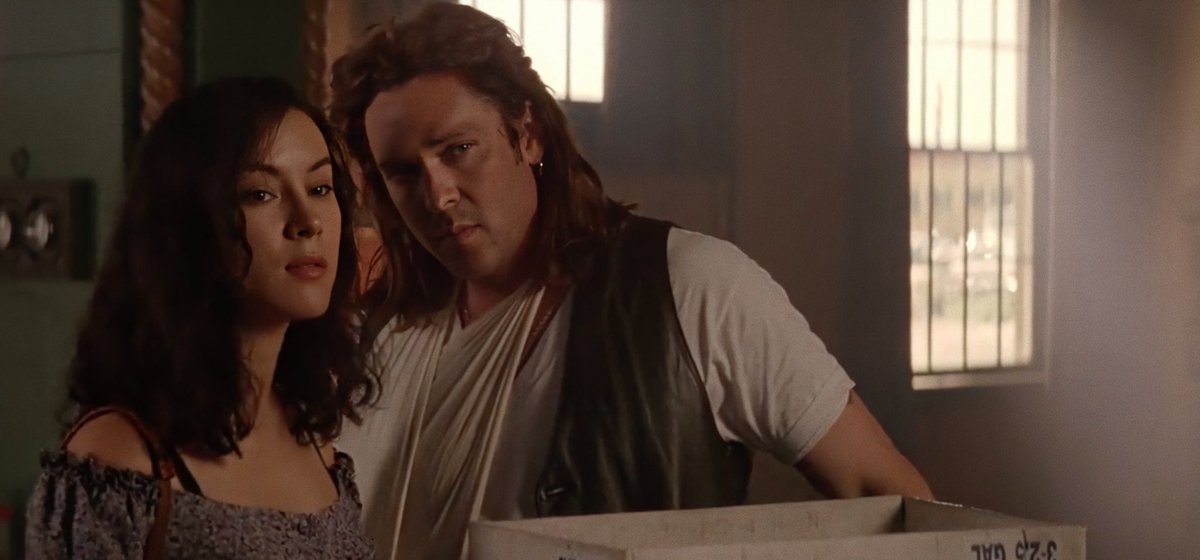
Hill’s screenplay is fleshed out here by writer Amy Jones, who injects significant additional sex and violence into the narrative, expanding the key beats of the original film. In these kinds of sub-noir crime tales, there is often a fine, trembling line between brutal violence and frenzied physical sexuality, both inherent to the criminal characters’ existence. Donaldson embraces this thematic crossover with gusto, bringing to the fore the numerous nude scenes involving Baldwin and Basinger, while inserting a cuckold subplot featuring Jennifer Tilly’s lip-biting honeypot, leading Michael Madsen’s feral Rudy into inevitable temptation. The blend of rugged, gun-driven brutality – a Walter Hill specialty – and seedy sex undoubtedly served to boost the film’s commercial prospects, especially when selling the salacious idea of real-life Hollywood lovers getting hot and heavy onscreen. Sadly, despite such tawdry enticements, The Getaway landed with a box-office thud, although it appears to have garnered a mild cult following in the age of home video and the “press pause” market.
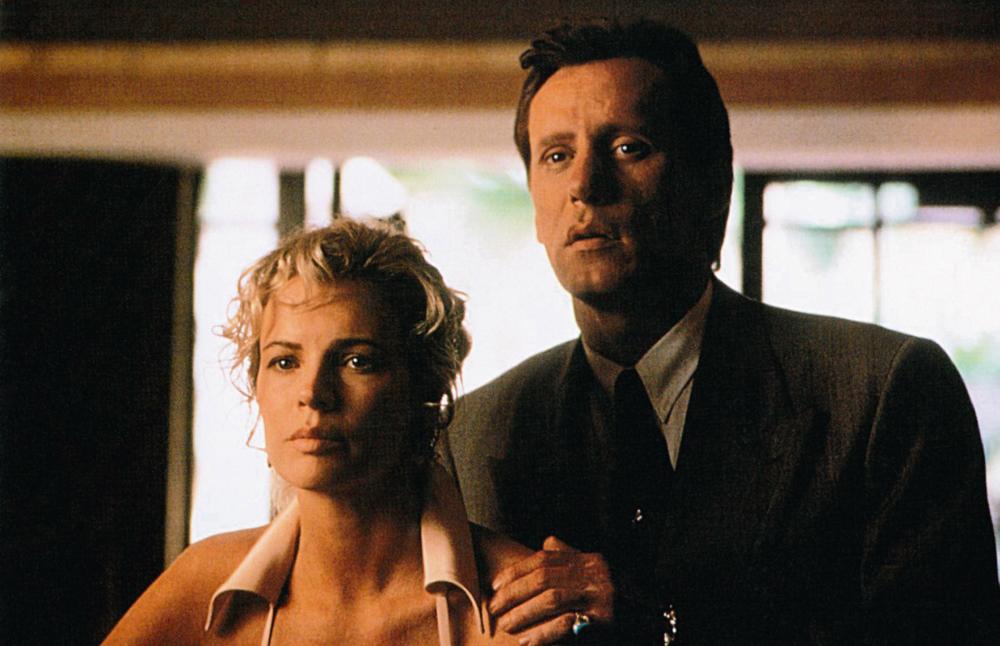
The film’s principal strengths lie in Donaldson’s near-miss attempt to emulate Hill’s muscular, bruising sensibility. True to form, betrayals and plot twists come thick and fast, offering plenty of surprises for a willing audience. By and large, the heist-driven plot hangs together thanks to some strong editorial geography and decent momentum. Donaldson does not shy away from the innate brutality of the material, though it feels like certain sequences were softened for commercial sensibilities, possibly to sneak the film into a lower rating bracket. That said, The Getaway remains a rollicking good time for fans of mid-90s action cinema: bullets slamming people into walls, fiery explosions, shocking carnage, and a few daffy plot contrivances that add ballast if not exactly complexity to the narrative.
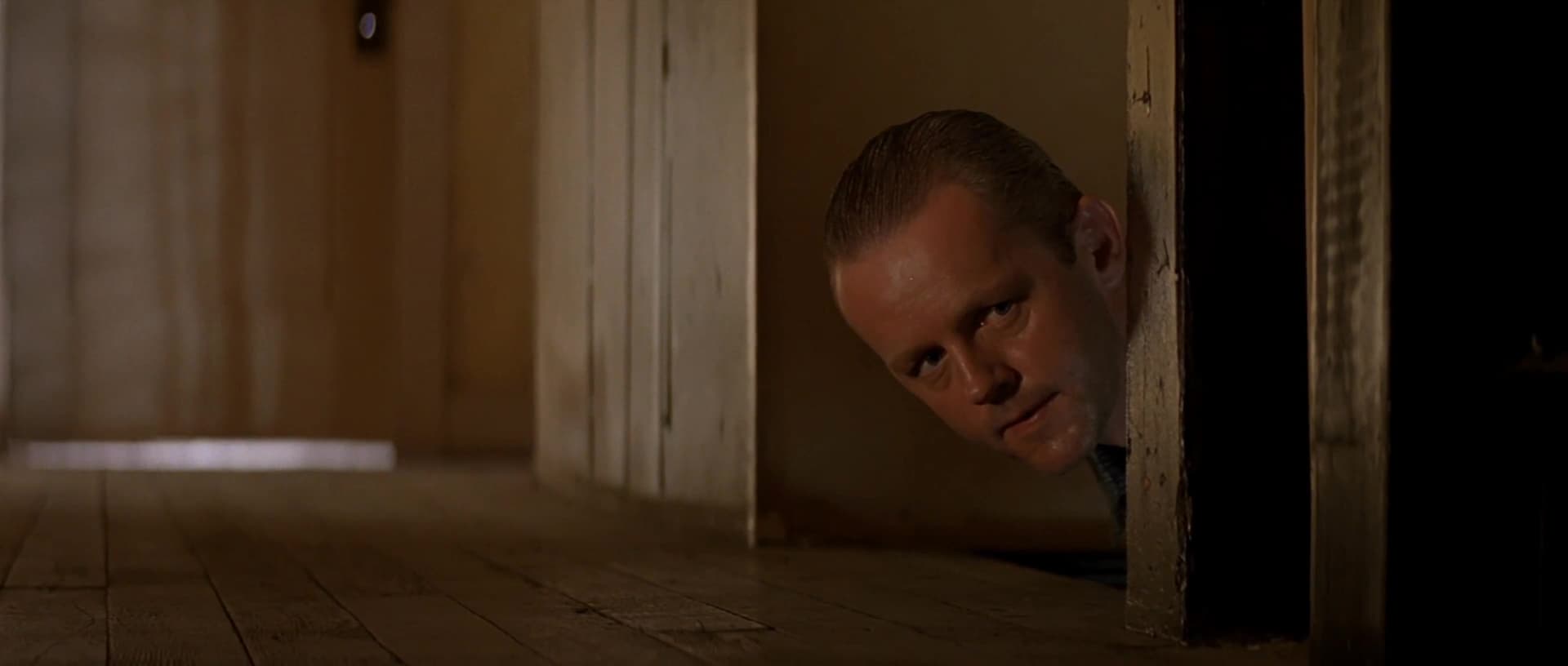
What the film lacks, however, is emotional weight. There is a distance between audience and character that The Getaway never quite bridges. Baldwin and Basinger both smoulder with physical presence, but their performances are undermined by dialogue so woeful it borders on parody. Watching two impossibly attractive human beings glower, snarl, and seduce their way through this twisting plot is a pleasure in and of itself, even if the emotional stakes are frustratingly hollow.
Kim Basinger, who picked up a pair of Razzie nominations for her work here, is hardly the film’s worst element. Saddled with a role trying desperately to find three dimensions within a story populated by cardboard cut-outs, Basinger does her best, though the script’s insistence on using her as eye-candy cannot be ignored. Her nude scenes are presented as much for titillation as for character insight. Baldwin, meanwhile, knows exactly the type of film he is in. He leans into the masculine anti-hero archetype with gusto, even if his laughably floppy hairstyle often undercuts his credibility. Still, both stars remain eminently watchable, particularly when tasked with selling some of the script’s more overblown exchanges.
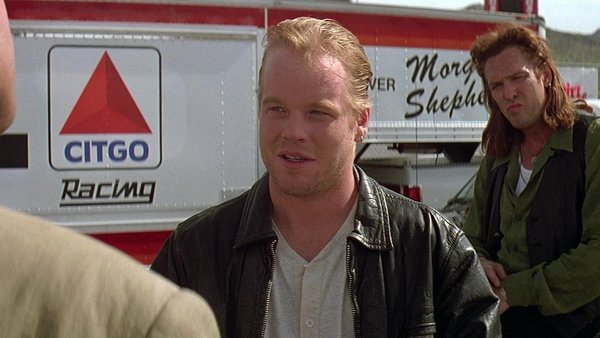
Supporting performances are a mixed bag. Michael Madsen’s portrayal of Rudy is an odd, twitchy collection of tics rather than a coherent character, and his scenes frequently wear out their welcome. Jennifer Tilly’s role as a demure but sexually manipulative housewife is amusing, if hopelessly one-note. Philip Hoffman (still a rising star) delivers a wild-eyed turn as a secondary heist participant, giving hints at the immense talents he would later fully realise. James Woods, typecast yet again as a slick, repugnant villain, delivers the kind of oily performance audiences came to expect from him throughout the 90s. David Morse, criminally underused, lends a layer of menace as one of Woods’ henchmen, though he is given precious little to do.
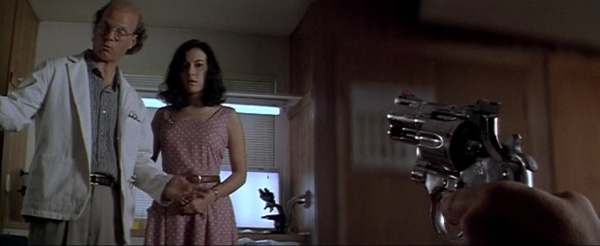
Visually, The Getaway is a sun-bleached delight. Australian cinematographer Peter Menzies Jr (whose credits include Die Hard With A Vengeance and Lara Croft: Tomb Raider) captures the dusty, sweaty landscapes of America’s South-West with a tactile realism that suits the material perfectly. The action sequences are crisply realised, the cityscapes and border towns brimming with the feel of decayed desperation. Composer Mark Isham (A River Runs Through It) delivers a bluesy, sax-infused score that feels quintessentially 90s: sensual for the sex scenes, synth-driven for the action beats. The film’s editing, handled by veteran Conrad Buff (Ghostbusters, Terminator 2, Titanic), ensures a tight pace even when the narrative stumbles. Production designer Joseph Nemec (Twister, Chief of Station) builds a world that feels authentically grimy, with seedy motels and crumbling urban wastelands lending atmosphere in spades.
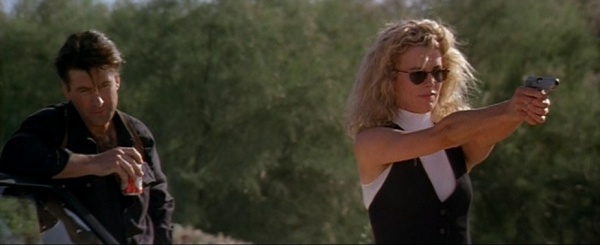
Despite its many positive aspects, The Getaway cannot quite overcome the mediocrity of its screenplay. Amy Jones’ expansion of Hill’s original script adds little in the way of nuance, instead leaning heavily into exploitative sex and cartoonish violence without ever offering the brittle tension that defines the best of noir. Some of the film’s dialogue is laughably unrealistic, undermining the suspension of disbelief, while the tone’s jagged inconsistency gives the film a strangely prickly, uneven feeling that may not satisfy every viewer.
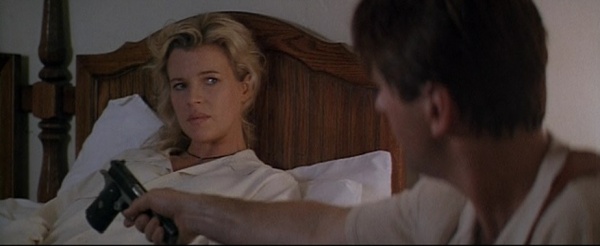
That said, The Getaway is hardly the turkey some online reviews have proclaimed. It is a solid, if unspectacular, 90s action-noir romp buoyed by the undeniable chemistry of its lead duo. In retrospect, the film plays better than its contemporary reputation suggests, and it remains a visually striking, if narratively unambitious, experience. The Baldwin-Basinger dynamic outshines more vaunted real-life Hollywood couples (Eyes Wide Shut, anyone?), and Donaldson’s directorial hand, while not quite reaching greatness, manages a stylish and frequently enjoyable experience.

Ultimately, The Getaway offers up a slick slice of violent Americana that, while hardly essential viewing, remains a worthwhile entry for fans of 90s crime cinema. Recommended primarily for the nostalgic charm of Baldwin and Basinger at their physical peaks, and for those who appreciate a good-looking noir done with rugged style, even if it falls short of the classics it so clearly seeks to emulate.

